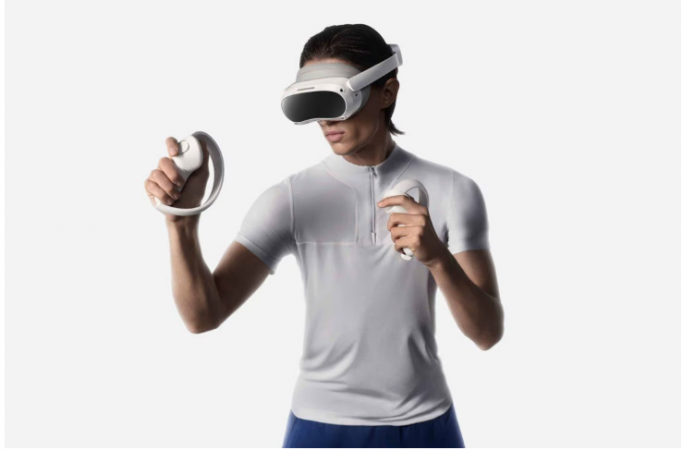
Beijing: Chinese enthusiasts have taken to the Pico 4 standalone virtual reality (VR) headset, which TikTok owner ByteDance introduced two weeks ago, while the Quest 2 from Meta Platforms, which competes, is still not available.
Through its own stores and independent dealers on Taobao and JD.com, the two most popular e-commerce sites in China, at least 10,000 units of the Pico 4 were sold. The South China Morning Post's owner, Alibaba Group Holding, also runs Taobao.
In contrast to similarly priced VR headsets, shipments were "fairly good," according to senior analyst Zhao Siquan of IDC. Pico did not provide numbers for offline sales.
Also Read: India's space economy to be worth USD12.8 bn by 2025
Young people in first- and second-tier cities are the majority of VR users in China, according to Zhao. "Given the Pico 4's features and cost, the product may be well received by customers. But its sales will also be influenced by the state of the economy, as well as by company promotions and platform content.
The Chinese social media juggernaut Pico can now compete with Facebook owner Meta in a new market thanks to ByteDance's acquisition of the company last year. The Reality Labs, formerly Oculus, that Meta acquired in 2014 creates the company's headsets.
Both the Pico 4 and the Quest 2 are equipped with Qualcomm's Snapdragon XR2 chipset, which supports up to 90 Hz of refresh rate. The Quest 2's single display can only display 1,832x1,920 pixels, whereas the Pico 4 offers a resolution of 2,160x2,160 pixels per eye.
Additionally less expensive, the Pico 4 starts at 429 euros (US$420) for 128 gigabytes of storage and 499 euros for 256GB in Europe. The Quest 2 retails for 449.99 euros and 549.99 euros, respectively, for the same storage options.
The Quest 2 is not formally offered in China, the home country of ByteDance, though some retailers do carry imported models. Before this past August, accessing Facebook—which is blocked in China—was necessary to activate the Quest 2.
Also Read: In Venezuela landslide left at least 22 people dead and dozens missing
Reviewers have given the Pico 4 positive feedback and praised its lightweight construction. The placement of the battery on the back of the strap, according to an influencer by the name of Kael, makes the headset feel more balanced.
Another influencer criticised this design, claiming that even though the Pico 4 appears to be much thinner than the Quest 2, the placement of the battery will have an impact on the user's experience when lying down.
The Pico 4 visor's official weight without the straps is 295 grammes. The Quest 2 weighs 503 grammes when the straps are attached.
For some users, device compatibility with other devices is also advantageous. The Pico 4 can be used for a first-person view using DJI drones, according to a user with the last name Zhou from the southwest Guizhou province, and it is compatible with all models.
Although a moderator on the company's forums cautioned in March that it is not officially supported as a third-party device, users have reported using the Quest 2 with DJI drones online.
The Pico 4's game selection, according to the same DJI user, was less impressive and lacked interesting games. He suggested that Pico "should work more on VR content and videos."
The Pico 4 offers options for exercising and watching live events like concerts and the upcoming Federation Internationale de Football Association (Fifa) World Cup in addition to video games. The world's largest sporting event, which begins in November in Qatar, was sublicensed by ByteDance in June.
Also Read: Review of the Sonos Sub Mini: a major upgrade in a small package
Later this month, the headset will be accessible in 13 European nations, as well as Japan and South Korea. The company stated in a press release last month that Pico has plans to introduce it in Singapore and Malaysia later this year. A US launch was not mentioned in the article.
According to a March article in Chinese media LatePost, Pico sold about 500,000 VR devices last year. That is still a huge difference from the figures Meta observes with its equipment. Between the Quest 2's launch in September 2020 and Cristiano Amon, CEO of Meta partner Qualcomm, releasing the figure in November 2021, the company shipped 10 million units.